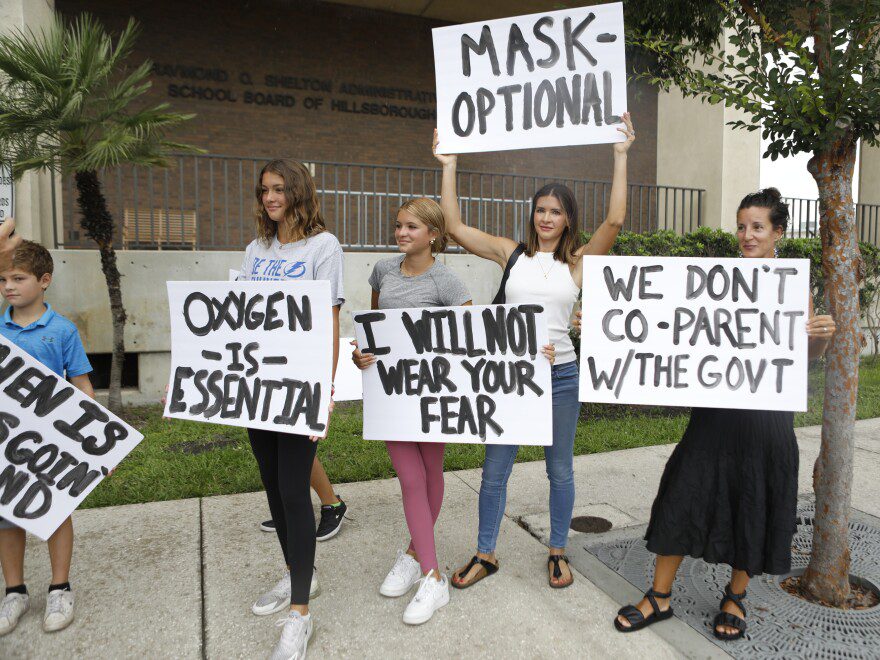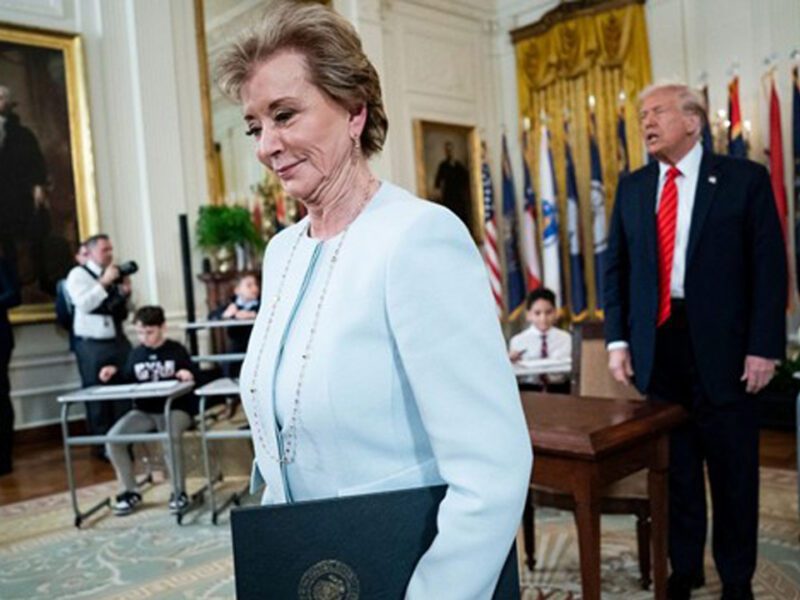
Progressives take a leaf out of the conservative playbook to target school boards
WUSF/npr | By Danielle Kurtzleben | May 31, 2022
A lot of people who run for school board are parents or teachers; 19-year-old Maryam Zafar is neither.
“I have a lot of like, really close experience to a big chunk of the people that we are supposed to be serving as a school board,” she said. “And just because of my age, people automatically know that I have a unique perspective, whether they’ve heard it or not.”
Zafar is a student at the University of Texas-Austin, and also a 2020 graduate of McNeil High School, in the Austin, Texas, suburb of Round Rock.
“I am really privileged to have gone here; it gave me a lot of opportunities, but it wasn’t always a healthy or safe space for me and my friends, especially in regards to sexual harassment and assault,” she said in the courtyard of Round Rock High School on a recent spring afternoon, as students left school for the day. “I was in ROTC, which was the Air Force program in my high school. And so one big part of my job that I kind of undertook as my responsibility, was in trying to handle any sort of harassment case that came up.”
That experience, she says, made her want to be a school board member in that district. To prepare for her run, Zafar has done trainings with the progressive group Run for Something.
The group has for years recruited people to run for many different offices, but cofounder Amanda Litman says they are putting new effort into school boards.
“One of the things we realized after 2020 was we have to focus in on these local positions like school boards,” Litman said. “There is such a need for broad progressive focusing on these local positions. There are more than 80,000 elected school board positions across the country. About 21,000 of them are up this year.”
A spike in attention on school boards
Interest in running for school board is up nationwide. Only 25% of school board races are unopposed this year, down from 35% last year and 40% in 2018, according to Ballotpedia.
Because school board elections are overwhelmingly nonpartisan, it’s hard to quantify who or what is behind all that energy.
But then, there has been an undeniable groundswell of conservative enthusiasm around school politics in the last few years, most notably around national issues like race, LGBTQ issues, and COVID. Groups like Moms for Liberty and No Left Turn in Education are among the groups working to harness parents’ frustration.
Progressives like Litman, at Run for Something, are hoping to make sure they have their own source of organization — not to mention funding — to counter the enthusiasm from the right.
“The far right is investing a ton in outside PAC spending. We have seen that the Leadership Institute, which is the Koch Brothers-funded nonprofit that does conservative training for operatives and activists, has been running for programming on school boards all year long,” Litman said. “Moms for Liberty is focusing hard on school board positions and candidate support. So they’re doubling and tripling down. Here we have to as well.”
School board politics get more partisan
It’s not totally new for national-level politics to become a part of school board elections — in the ’90s, conservative parents targeted the teaching of sex education and evolution. Likewise, opposition to the No Child Left Behind policy galvanized some parents during the George W. Bush presidency.
But the political landscape has vastly changed.
“What’s different this time is the coordination, the financing and then social media really being able to spread a very consistent message to so many school districts so quickly,” said Rebecca Jacobsen, professor of educational policy at Michigan State University, “whereas in previous eras, before internet and social media, these things happened, but at much slower paces. And in some ways, that slower pace gave rise to alternative voices, voices that maybe moderated the discussion.”
And she says she fears that that kind of polarization at the local level could have worrying long-term effects for the public school system.
“Schools really are sort of the last holdout in our support for a big public institution, “Jacobsen said. “And so I think that that is maybe the more important impact of this than anything else, whether the policy becomes X or Y. I think whether we continue to believe that our local schools are good for all kids and that I want to continue sending my children there and supporting taxes. That, to me, is the bigger question.”
Round Rock has seen national-level tensions play out locally – one turbulent September meeting, where parents and board members clashed over masking, culminated in two arrests.
Zafar says that she’s worried about meetings having been politicized.
“I have definitely seen that here,” she said. “We’ve had a lot of disruption in our school board around mask mandates, and it’s there has been a lot of legal action taken about that, and it’s been a disruption to focusing on student outcomes and on the health and wellness of students.”
At a Board of Trustees meeting this spring, Christy Slape said that social media and YouTube have helped galvanize area parents like her. She came to the meeting to speak about books she thought were, in her words, too sexual. She had first heard about the books when a fellow parent complained to the school.
“That just launched a whole basically like a snowball of parents wanting to know more about what books were in the classroom, and then other books being available in the libraries,” she said. “And so across the country, there has been just a snowball effect of parents wanting to check their libraries and see what books are available in their libraries.”
Intensely local fights
Slape did speak, but books were not on the agenda that night. Overwhelmingly, this board meeting was not about cultural flashpoints but instead, district concerns like student recognition and staff pay increases. That’s a point that can be obscured by viral video clips of rowdy school board meetings: local school-board politics are very often not about national cultural conversations but instead, more mundane yet vital local topics, like bond issues.
Along those lines, Litman says she advises candidates to stick to concrete local fixes, as opposed to debates over things like critical race theory.
“You want to, like, really get to the heart of the matter, which is people are anxious about the quality of the school. What can you do to solve for that?” she said. “And usually it’s quite boring. But it’s also the things that are very specific and tangible that you can fix.”
But then, school board members may confront problems they can’t fix. The school shooting in Uvalde, Texas, has put gun violence top of mind for Zafar, who grew up in the era of school lockdowns.
“It’s been a really important issue to me since I was a kid – I used to have nightmares about being shot,” she said.
But she’s also realistic about how much a school board member can do about shootings.
“I don’t think we can do much about guns themselves,” she said. “I think all we do is safety policies and locking people down and making sure people have the education to know what to do in a lockdown.”
Meanwhile, Litman says she hopes members can have influence beyond their schools.
“I really think in many cases, the place for school board members is what can they do to push state legislators? How can school board members use their political platform and their bully pulpit to help advocate for broader statewide change?” she said.
While national politics have filtered down to school boards, in other words, her hope is that some members’ political views will filter upward.





